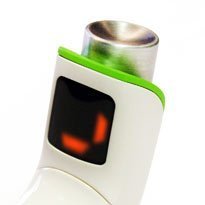Inhaler training by video game
- 2 April 2012

Cambridge Consultants has created an asthma inhaler training device that provides real-time, visual feedback to the user via an interactive video game.
If the patient uses the T-Haler device correctly, a ball will fall down a hole on a screen, in much the same way that a golfer successfully ‘puts’ a ball in a golf simulation game.
If the patient doesn’t use the T-Haler correctly, the ball will not reach the hole. Instead, it will roll onto one of four squares, each providing a specific comment for the patient on how to improve their technique.
“Every 12 minutes a child in the UK is admitted into hospital with an asthma related issue,” said Kate Farrell, senior design engineer, medical technology at Cambridge Consultants.
“Lots of studies show 90% of people don’t use the MDI (metered-dose inhaler) properly and we wanted to use our technologies to improve compliance.”
Farrell told eHealth Insider that the device was inspired by computer game platforms such as the Wii, which incorporate effective wireless technology.
Fifty healthy participants were chosen for an initial study. None had a history of respiratory problems.
Every participant was asked to use an inhaler, but only around 20% used it correctly. They were then given instruction with the T-Haler device, after which around 60% used it correctly.
“What was remarkable about the T-Haler in our own study was how quickly the participants learned, and how well the knowledge stayed with them,” Farrell said.
“Without any human direction beyond the word ‘go’, participants went from a 20% success rate without training to a success rate of more than 60% after only three minutes with the device.”
The T-Haler measures three key factors for proper inhaler use. First, whether the patient has shaken the inhaler prior to breathing; second, the force with which they breath in; third, when they press down on the canister (the step which releases the drug).
“We have taken T-Haler up to a point but if other parties had a commercial interest then it might be open to them,” Farrell said.
T-Haler is the latest example of Cambridge Consultants applying its expertise in ‘Px’ development – the art and science of designing around the patient experience.
It has also been responsible for the development of flexi-ject, an auto-injecting device used for treating Rheumatoid Arthritis and Multiple Sclerosis.



